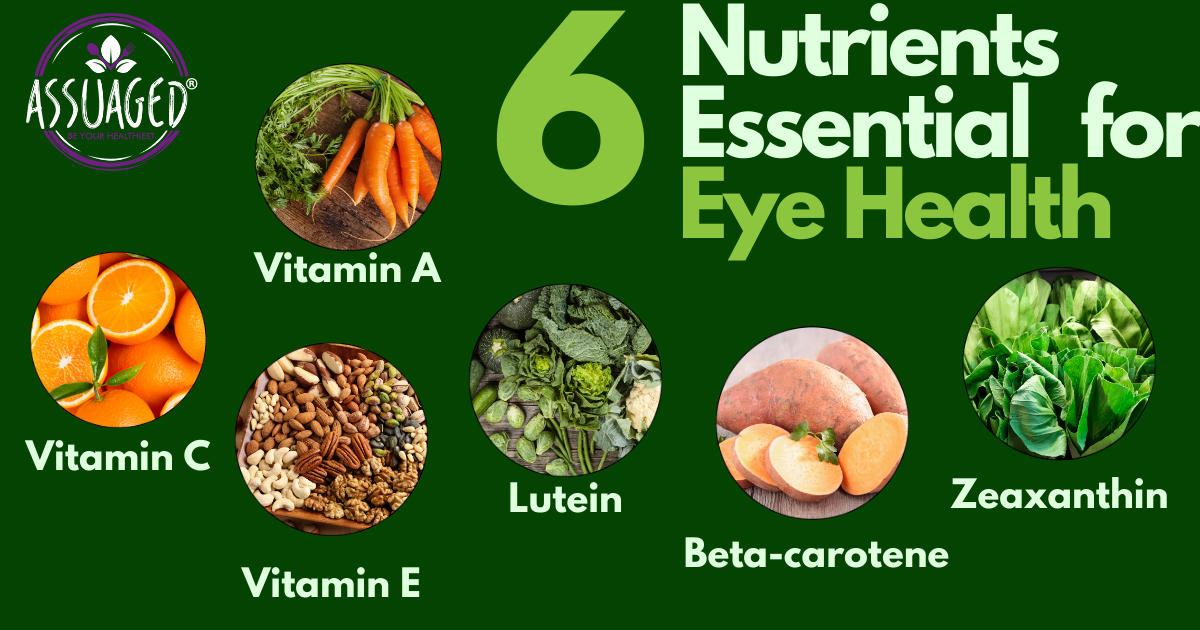In our quest for overall health, we often overlook the importance of maintaining good eye health. However, the truth is that our vision is intricately connected to our diet and lifestyle.
In this blog post, we'll delve into the role of nutrition in promoting eye health, specifically focusing on the benefits of a plant-based diet.
By understanding how plant-based nutrition can support public eye health, we can empower individuals to make informed dietary choices that benefit not only themselves but also their communities.

Nutrients Essential for Eye Health
Consuming nutrients can be essential for your health and wellness. Here are some essential nutrients beneficial for your eye:

-
- Vitamin A and Beta-Carotene:
Vitamin A is important for maintaining healthy vision, particularly in low-light conditions. It is a component of rhodopsin [1], a protein in the retina that enables the eyes to adjust to changes in light.
Beta-carotene, a precursor to Vitamin A found in many fruits and vegetables, also plays a role in supporting vision and may help reduce the risk of age-related macular degeneration (AMD)[2] and cataracts by acting as an antioxidant.
- Vitamin C:
Vitamin C is an antioxidant that helps protect the eyes from damage caused by free radicals, which can contribute to the development of cataracts and AMD. It also supports the health of blood vessels in the eyes, promoting proper circulation and reducing the risk of conditions like diabetic retinopathy.[3]
- Vitamin E:
Vitamin E is an antioxidant that helps protect cells, including those in the eyes, from oxidative stress caused by free radicals. It may help reduce the risk of cataracts[4] and AMD by neutralizing harmful molecules and supporting overall eye health.
- Lutein and Zeaxanthin:
Lutein and zeaxanthin are carotenoids[5] that accumulate in the retina, particularly in the macula, where they form a protective layer that filters out harmful blue light and reduces oxidative damage.
Consuming foods rich in lutein and zeaxanthin, such as leafy greens, eggs, and corn, can help maintain optimal levels of these nutrients in the eyes and support long-term eye health.
- Vitamin A and Beta-Carotene:
.png?width=1200&height=630&name=Visionary-Nutrition%20(1).png)
Benefits of a Plant-Based Diet for Eye Health
In the pursuit of vibrant health, the foods we consume play a crucial role, not just for our overall well-being but also for the health of our eyes. Here's how a plant-based diet can benefit eye health:
- Rich in Antioxidants:
Plant-based diets are abundant in antioxidants and phytochemicals, which are compounds found in plants that have protective effects on the body. Antioxidants such as vitamin C, vitamin E, lutein, and zeaxanthin are particularly beneficial for eye health as they help protect against AMD, cataracts, and other eye conditions. -
Low in Saturated Fat:
Unlike many animal-based foods, plant-based diets are naturally low in saturated fats and cholesterol. High intake of saturated fats and cholesterol has been linked to an increased[6] risk of cardiovascular diseases, which can indirectly impact eye health by affecting blood flow to the eyes.
-
Anti-Inflammatory Properties:
By consuming a diet abundant in anti-inflammatory foods, individuals can help reduce inflammation throughout their body, including their eyes. Reducing inflammation can promote better overall eye health and function, contributing to clearer vision and reduced discomfort.
By embracing a plant-based lifestyle, individuals can support not only their heart health and weight control but also promote optimal eye health and function.
Incorporating Plant-Based Foods for Eye Health
.png?width=1200&height=630&name=Visionary-Nutrition%20(2).png)
- Embrace colorful fruits and vegetables rich in essential nutrients.
-
Highlight the importance of including a variety of vibrant fruits and vegetables such as spinach, kale, carrots, and bell peppers.
-
Spinach and kale are rich sources of lutein and zeaxanthin, antioxidants that protect against age-related macular degeneration.
-
Carrots contain beta-carotene, which is essential for good vision, especially in low-light conditions.
-
Bell peppers provide Vitamin C, supporting blood vessel health in the eyes and reducing the risk of cataracts.
-
- Incorporate nuts and seeds for omega-3 fatty acids and vitamin E.
-
Omega-3 fatty acids found in walnuts, flaxseeds, and chia seeds play a crucial role in maintaining the structural integrity of cell membranes in the eyes, promoting healthy vision, and reducing the risk of dry eye syndrome.
- Vitamin E, abundant in nuts and seeds, acts as an antioxidant, protecting eye cells from oxidative damage and inflammation, thus supporting overall ocular wellness.
-
- Opt for whole grains, legumes, and plant-based proteins.
-
Whole grains like quinoa are rich in zinc, a mineral crucial for maintaining healthy eyes and supporting proper immune function.
- Legumes such as lentils and beans are excellent sources of protein, which is essential for the growth and repair of eye tissues.
- Plant-based proteins like tofu offer a nutritious alternative to animal-based proteins, providing amino acids necessary for building and maintaining healthy eye muscles and tissues.
-
Lifestyle Factors and Eye Health
Our eyes, often referred to as the windows to the soul, are also crucial indicators of our overall health. While we're familiar with the basics of eye care, such as regular check-ups and wearing sunglasses, there's more to maintaining optimal eye health than meets the eye.
Let's delve into three lifestyle factors that play a pivotal role in nurturing healthy eyes: hydration, sleep, stress management, and how they complement a plant-based diet.
Importance of Hydration for Eye Health
- Hydration ensures moist and lubricated eyes, preventing discomfort.
- Water is essential for tear production, guarding against dry eyes.
- Aim for adequate water intake and include hydrating foods in your diet.
.png?width=1200&height=630&name=Visionary-Nutrition%20(3).png)
Impact of Sleep and Stress Management on Eye Function
- Quality sleep supports eye repair processes and reduces eye fatigue.
- Chronic stress can lead to eye strain and worsen existing eye conditions.
- Practice relaxation techniques and prioritize restful sleep for eye health.
.png?width=1200&height=630&name=Visionary-Nutrition%20(4).png)
By prioritizing hydration, quality sleep, stress management, and a plant-based diet rich in eye-nourishing nutrients, you'll pave the way for vibrant, healthy eyes that reflect your overall well-being.
Seeking Help and Support
Maintaining optimal eye health involves a holistic approach, and seeking help when needed is crucial. Here are some avenues to consider:
-
Consult an Eye Care Professional:
Schedule regular eye exams with an optometrist or ophthalmologist. These professionals can assess your eye health, detect any issues early on, and provide personalized recommendations for maintaining or improving your vision.
-
Registered Dietitian Nutritionist (RDN):
If you have questions about how your diet impacts your eye health, consider consulting with an RDN. They can offer expert guidance on incorporating eye-friendly nutrients into your plant-based diet and help address any nutritional deficiencies that may affect your vision.
-
Join Support Groups or Online Forums:
Connecting with others who are also focused on eye health can provide valuable support and encouragement. Look for local support groups or online forums where you can share experiences, ask questions, and learn from others who are on a similar journey.
-
Educational Resources:
Take advantage of educational resources dedicated to eye health and nutrition. Reputable organizations often provide articles, guides, and webinars that offer evidence-based information and practical tips for supporting eye health through diet and lifestyle choices.
-
Community Resources:
Explore community resources such as health centers, clinics, or local events focused on eye health. These resources may offer screenings, educational workshops, or access to low-cost eye care services for those in need.














